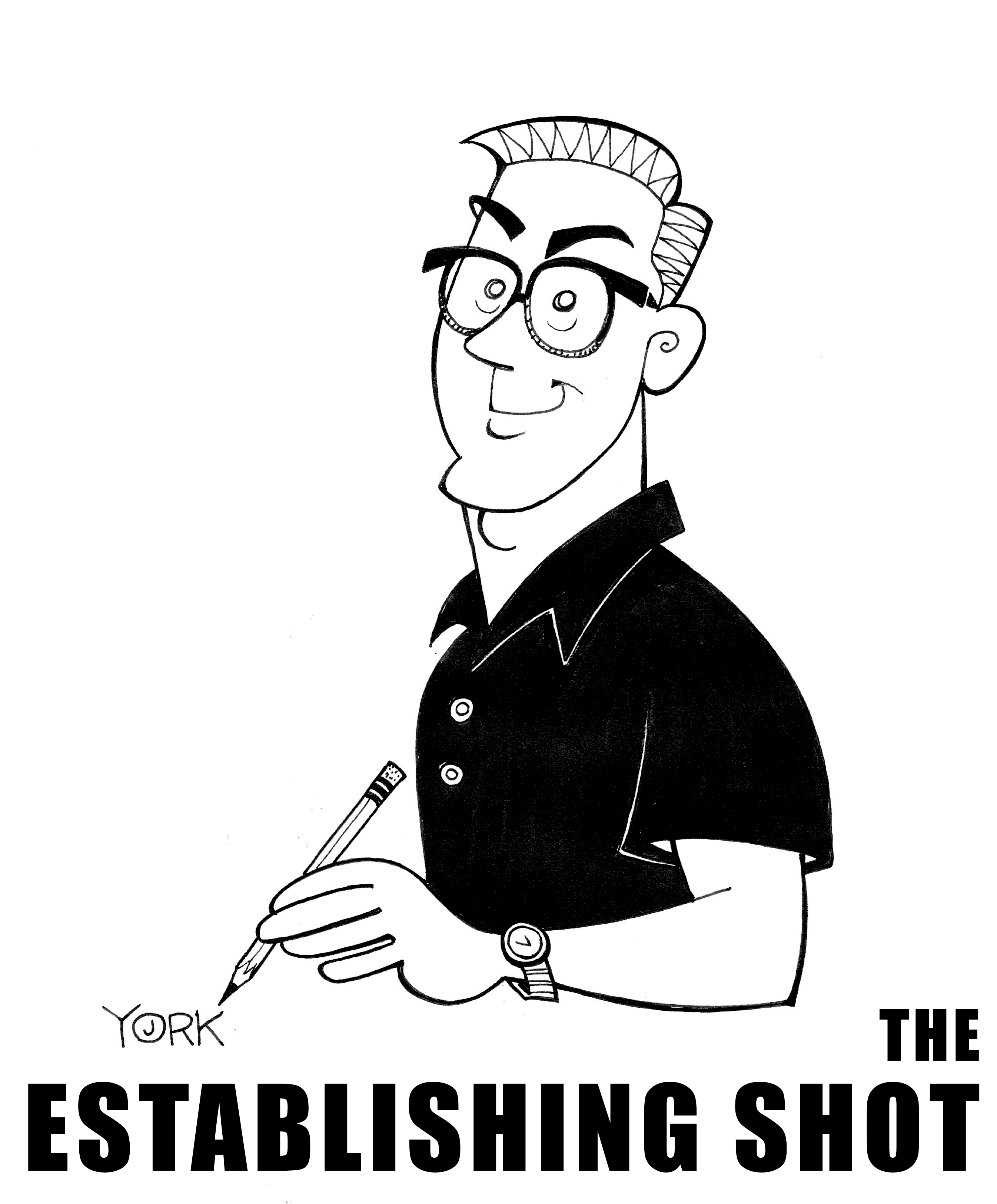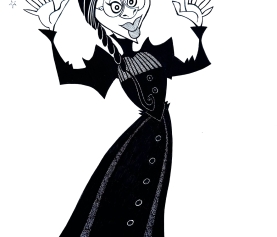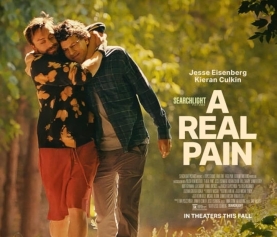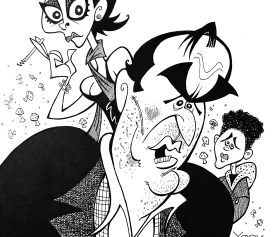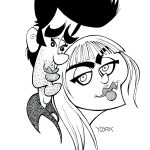
Original caricature by Jeff York of Lady Gaga as Harley “Lee” Quinzel in JOKER: FOLIE A DEUX (copyright 2024)
Many who’ve seen JOKER: FOLIE A DEUX have not been kind online to director Todd Phillips’ sequel. Many of those same folks had little good to say about Phillips’ 2019 commercial and box office smash JOKER either, yet it won two Oscars (Best Actor and Best Original Score) and was nominated for nine others including Best Picture. The sequel is a continuation of the adaptation from Phillips and co-scripter Scott Silver written as an alternative take on the most famed villain in the DC Comics canon. Both films are about loneliness, victimization, the class system, and, most importantly, how psychosis has been turned into another form of celebrity in American culture from our obsession with film, TV, and comic antiheroes to true crime to tribalism in politics. JOKER had its cake and ate it too, making much of the villainy understandable, even cathartic. Here, there is precious little to laugh at or laud, as it focuses on the utter frailty of the mind of Arthur Fleck/The Joker (Joaquin Phoenix) and how everyone around him in this film now exploits his psychosis for their means. It’s an ugly subject and a hard film to watch, but it’s not worthy of the diatribes many have lobbed at it.
I doubt that Phillips was trying to flip off DC or their fans, but rather, explore the limits of a villain. In the comics and all the various productions on the big and small screen that have been produced from it, the Joker is Batman’s arch nemesis. Yet, despite killing hundreds, threatening millions, and even raping and handicapping Barbara Gordon (AKA Batgirl) in one famed comic one-off, Batman lets the Joker live. Then the baddie escapes and the whole cycle of violence starts all over again. That’s entertainment? This is the question Phillips et al. seem to be asking in both films. And it’s a very good one too as generations have eaten it up with a spoon for over two centuries now. And our appetites only seem to be getting more insatiable.
In JOKER: FOLIE A DEUX ( Joker: Madness for Two), Phillips doesn’t start with the obvious sequel setup in the last moments of the previous film. You may recall that Arthur escaped his therapist at Arkham and left some bloody footprints in his wake, suggesting that he did not leave the doctor in the healthiest of states. But that’s not where FOLIE A DEUX begins. Here, Arthur is incarcerated once again and now awaiting trial for his murder of five people. (He’s killed six, but no one knows about his matricide yet.) With Arthur stuck behind bars, don’t expect a rousing version of ONE FLEW OVER THE CUCKOO’s NEST here. Arthur is hardly Randall McMurphy rousing the other inmates to fight for their rights. Quite the opposite as this antihero finds himself lost in even more of a mundane existence. Being incarcerated only increases his self-loathing, fear of the outside world and fragility in following norms. His mind is not only warped, it’s utterly depressed.
One day, Arthur breaks into song while watching the classic MGM musical THE BAND WAGON on the communal TV and inspires the head guard Jackie Sullivan (Brendan Gleeson) to submit him to the Arkham choir. There he meets choir member Harley “Lee” Quinzel (a stellar Lady Gaga) and she takes an immediate interest in the celebrity inmate in the tenor section. Lee comes on strong to Arthur, announcing that she’s in love with him after only a few moments. Lee has a deep desire to love him and escape their confines, especially so they can bring down the establishment all the more, finishing what Arthur/Joker seemed to have started in Gotham.
Arthur isn’t interested in such ambitions, however; he’s bewitched by her attention and falls hard for her. His defense attorney (Catherine Keener) warns him that it’s likely a con, but the intimacy-starved sap doesn’t listen. His infatuation with Lee even risks his chances at freedom since he’s preoccupied with her being in the audience in the courtroom, rather than concentrating on ensuring he comes across as sympathetic to the watching jury.
But despite Lee’s desire for him to embrace her, as well as his vicious side, Arthur remains reluctant. And for those hoping Arthur will rise once again and wreak such havoc as in the first, well, they’ll be disappointed too. This is not a story about Joker becoming a Gotham kingpin, it’s a story about Fleck’s psychosis and the exploitation of his fragile state by those around him. As the film showcases in scene after scene, everyone is using Arthur, from the ambitious D.A. Harvey Dent to the judge who’s allowed cameras into the courtroom and Arthur to wear clown makeup to the guards bullying Arthur to boost their egos.
Arthur’s story feels less like all those famed Joker tales before and more like the story of Jeffrey Dahmer. The real-life serial killer was metaphorically neutered by his jailing and turned into a morose shell of his former self. Just like Arthur here. He’s no longer the strident, self-amused avenger, the voice of the forgotten howling at the world’s injustice. Instead, he’s merely a lost soul, hoping Lee’s love is true, and finding solace in fantasy musical numbers he’s created in his mind singing and dancing with her. It’s his only escape. And it’s tragic. This is, after all, a tragedy and not in any way, a comedy.
More than anything, this drama is a very disturbing commentary on how society goes too far in putting antiheroes and their sociopathy on a pedestal. We love true crime stories more than any other kind as they dominate ratings and bestseller lists. Police procedurals make up most of our scripted dramas these days and have since the 60s. We idolize bad guys, bad boys, and outright villains, sexualizing every scoundrel from J.R. Ewing to Tony Soprano. Heck, on the other side of the DC aisle, there are Marvel villains like Loki who get their very own TV series to star in. Crime podcasts outpace any other by almost 2 to 1. The Menendez Brothers are looking for career rehabilitation. Every shooting gets 24/7 coverage on cable news and such violence doesn’t affect changes in policies, only changes in ratings. And our current presidential contest has one political party running a convicted felon. Are we still entertained? Do we blame the players or the game? And can we admit our complicity as the audience? These are the questions Phillips et al. are asking. They’re not here to service Batman lore. They’re wondering if we’re all nuts.
Now, we can argue whether or not the musical numbers Todd Phillips infuses this sequel with are in excess or less than cleverly staged. We can wince or yawn, depending on how one feels about the constant repetition of Arthur’s unintentional guffaws or getting beaten. We can even argue whether some of the points Phillips & company are making are too on-the-nose. Still, that’s mostly window dressing. The core here is the film’s focus on villainy and where that line is drawn. Arthur Fleck may be the clown here, but who are the ringleaders, and who makes up the circus? And all of it is damn far from funny.
